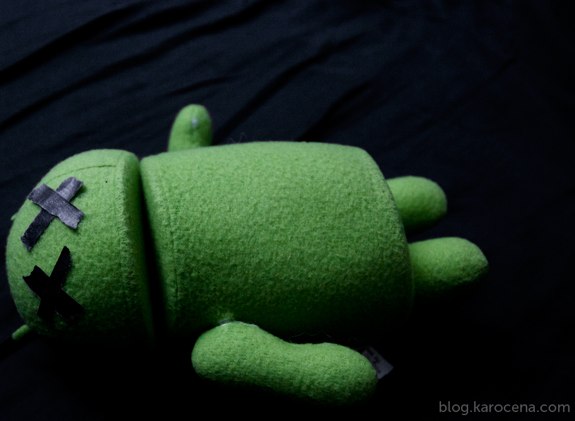Find Our Latest Video Reviews on YouTube!
If you want to stay on top of all of our video reviews of the latest tech, be sure to check out and subscribe to the Gear Live YouTube channel, hosted by Andru Edwards! It’s free!
Tuesday April 9, 2013 5:56 pm
Why Google will stop developing Android

"It's important that Apple not be the developer for the world. We can't take all of our energy, and all of our care, and finish the painting and have someone else put their name on it." - Tim Cook, Apple CEO
The same statement rings true for Google. If others are reaping the rewards, and little to nothing is left for oneself, then what's the point? If a product does not meet the expectations set before it, then developing for it doesn't make much sense. If any given product is not self-sustainable, then it is not cost effective and eventually becomes a burden to the maker--even if users appear to enjoy using it. Make no mistake about it, Google is in the business of making money, and everything else is secondary (including good will.)
Google's co-founder and now recently-minted CEO, Larry Page, bought Android in 2005. He also brought along Andy Rubin, one of its creators, over to Google, who recently renounced his post as Senior Vice President of mobile Digital Content. Basically, the guy who was leading Android. It has been said that Sergey Brin, the other tandem co-founder, was not enthusiastic about the purchase. Former Google CEO at the time, Eric Schmidt, now Chairman at Google had a similar reaction. These somewhat pessimistic receptions were also shared by Vic Gundotra, Senior Vice President of Engineering. However, he recanted these thoughts at Google I/O 2010.
"I'll level with you, I was skeptical. In fact, I interrupted Andy. Andy, I don't get it. Does the world need another mobile operating system? Google's about advertising.
Vic continues by sharing Andy's vision of Android and the benefits against the possible threat of Apple's iPhone and AT&T:
"To this day, I remember Andy's response. and he made two points. The first point made was that it was critically important to provide a free mobile operating system, an open source operating system, that would enable innovation at every level of the stack. In other words, OEMs should be free to build all kinds of devices, devices with keyboards, without keyboards, with front-facing cameras, two inches, three, four inches, that operators should be able to compete on the strength and coverage their network, 2G, 3G, 4G, LTP, CDMA. And that in the end, with innovation coming at every layer, it would be the consumer who would be able to benefit by getting the best device and best network for them."
"I remember Andy's second point. He argued that if Google did not act, we faced a Draconian future, future where one man, one company, one device, one carrier would be our only choice."
Almost five years later and...mission accomplished? Yes, and no. Innovation has indeed come in different layers of the stack since the days of the HTC T-Mobile G1. Carriers have somewhat advanced their wireless technologies. Arguably, it would have happened despite Android, albeit slower. Users have a plethora of choices of devices ranging in sizes and features; all provided by many Android OEMs. But the real question is this, has this benefited Google? A tree that doesn't bear fruit will be cut off.
Android is the market share leader in mobile OS, a title once held by Symbian. A similar approach that helped them propel to this lead was by offering a low cost budget friendly devices. Sadly, the catch is that these devices lack performance and usability and are orphaned. The lead is bubbly and has come at a higher cost due to fragmentation and security concerns and, worst of all, Google sees little revenue from Android. Furthermore, the iPhone provided more income via data from its users for Google than Android did, which is partly the reason why Apple is detoxing its devices from shipping with Google services baked in. As of now, the only visible and successful Android hardware maker, Samsung, is cannibalizing Android OEM profits, 25% of worldwide smartphone profits. While that "draconian" company with their one device is offered in all US carriers along with over 200 carriers in 100 countries throughout the world, which rakes a whopping 70% mobile profits worldwide and growing market share at a steady clip.
All the while Google, being the other developer of the world, is making chump change. To put these numbers in to perspective, the Galaxy line alone makes more money than Google's entire business. Some have estimated that Microsoft makes more money from licenses provided to Android OEMs and generates more profits than Google's take from Android.
All that said, it seems that Chrome OS (soon Chrome OS for mobile) is more in line with the philosophy goal in mind for Google's profits in the web and, more importantly, mobile web, which Android fails at generating. As users are not using Android devices for web browsing and/or are not using them as smart devices. Low app usage and app payment disparity, if you don't count the Facebook app (more on Facebook later), Vic Gundotra said it best, "Google is about advertising." And this fact has not changed as 97% of Google profits are from desktop web; mostly via user data habit collection for the purpose of targeted ads. Make no mistake about it, Search is Google's thoroughbred horse.
The Android purchase and launch was before the launch of the Chrome browser and the Chrome OS went public, as it was natural to hedge bets for the company's future first on Android. Yet spending money on developing Android has proven to not be cost effective for Google as its only main financial benefactor is Samsung. Google's version of Open with Android has proven to be a double-edged sword. Only the strongest host survives or, at the very least, the most visible. This is why skinning was so vital for the purpose of differentiation. Most Galaxy customers think that TouchWiz is Android. Same could be said about MotoBlur, HTC Sense, and soon Facebook Home.
My prediction? Google will eventually stop developing Android, allowing others to take over its future development. Over thirteen billion dollars (and counting) spent due to a knee-jerk reaction with the Motorola purchase alone for the sake of Android. Obtained patents failed at protecting Android, whether it be offensively and defensively used against Apple, Nokia, and Microsoft. If anything could be salvaged from the struggling Motorola, it would be that it builds future mobile devises running Chrome OS and not Android.
With Chrome OS, users have no choice but to use the web since that's what it's based on, with much deeper hooks at generating profits that are more directly tied with Google's SaaS, as it chips away at Microsoft. Now, with always connected mobile devices running Chrome OS, users won't have the same issues with Chromebooks. There are no stock skins that alter the Chrome OS desktop by OEM makers. Sure, there might exist some bloatware concepts carried over from the legacy days of Windows, but that's about it...if that. There is little to no fragmentation in Chrome OS.
Android is vectored attacked in all fronts. Lets face it, Facebook's recent event has made matters worse as it encroaches what little is left of profits for Google since both companies generate profits through advertising with user data is the currency. While Facebook Home has some potential, socially awkward UI concepts and potential privacy issues that could hinder it's reception with users. Facebook will be sure to make mistakes along the way, but will fix them in short order. Facebook recognizes that it is in a similar situation as Google--mobile is the future. From a business perspective, Facebook Home is a Trojan horse, ready to take over the remaining strong hold, but from within. Facebook blurred the lines between the negative connotation of an Android fork and OEM Skin. Facebook Home has the goal in mind to change Android user behavior in a huge way, but it will be more cost effective, since Google is forking up the majority of the cost.
It is down to a two horse race, as the old guards of phone making are either struggling, on life support or dead. Again, it is worth stressing that smartphone profits are roughly split around 70/25; the majority goes to Apple, with Samsung in second place, and seemingly ready to cut Google out with its own Tizen OS. Samsung could also potentially just fork Android and substitute Google features with its own "S" brand features. Let us not forget Amazon, which has the content distribution ecosystem that paved the path to follow to fully fork Android. It is, by far, the most successful at selling (modified version) Android tablets. Which, again, cuts out Google from generating profits out of the equation. Expect an Amazon Smartphone, soon.
It is naive to think that Google didn't have high hopes for Android to be a breadwinner or, better said, that Andy Rubin had an agenda when he pitched that idea to Larry Page. Open and free gives carriers, hardware makers and developers, warm feelings of limitless potential. Now, mix that with some fear, uncertainty, and doubt from the threats competitors like Apple. Hook, line, and sinker--the idea was sold and Google ran with it.
Now, Andy has relinquished his duties to Sundar Pichai, Senior Vice President of Chrome and Apps, the very guy who is also in charge of Chrome OS and the Chrome browser, and who now has the tall task of setting a new course direction where he must reconcile issues plaguing Android or abandon it altogether. Worst case scenario, Android becomes more proprietary. The contention from within, perhaps, is that Google is showing signs that it's not so much in denial and is making moves.
There was a legitimate reason, sadly lost in translation, when Eric Schmidt, who had a change of heart, went out of his way to dispel any notion that Chrome OS and Android might merge. There are too many reasons why such a Herculean effort would be a daunting task, and accomplishing it would be backbreaking. Android has too much baggage. It would behoove Google to seek out the clean slate alternative. In some ways, look at how this mashup is turning out with Windows 8 and the Surface.
Android was supposed to be Google's new revenue stream leading it into the future. It was meant to break the carrier's hold and further build on the achievements of the iPhone at reducing carriers into dumb pipes. In turn you see the blame game, struggling Android OEMs squabble at accusing the more empowered carriers of preventing them from pushing timely updates to customers. You can take that excuse with a grain of salt, since it would benefit OEMs to phase out older devices with artificial limitations sooner in order to push new devices than to provide legacy support. Stats don't lie, fragmentation has orphaned many Android devices. The Android Update Alliance has turned out to be a sham. There are too many Google initiatives to list that started well yet have ended up being sunsetted, decommissioned, or that no longer have reason to continue. Google is failing at the monetization part of Android. It's not hard to see that for the future development of Android by Google, for better or worse, is on a similar path, as the fork in the road of where to go next is quickly approaching.











